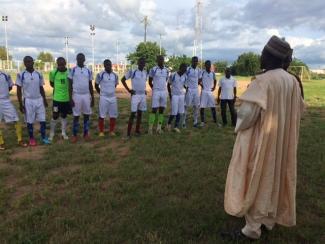October 2015—In a state hard hit by violent extremism, Nigerian youth are developing a shared sense of identity and fellowship across different religious, ethnic and cultural backgrounds, building stronger relationships and communities. And they’re doing it through sports.
The Peace Through Sports project, led by the American University of Nigeria with support from USAID’s Office of Transition Initiatives, has been hosting a six-month sports tournament to recognize and build youth self-esteem, resilience and tolerance. Youth participants, diverse in geographic origin, attend local secondary schools or were identified as vulnerable to violent extremism. Over 1,500 local youth from the northeastern state of Adamawa have been competing on 104 soccer, basketball and volleyball teams.
Forty-eight soccer teams of local young people representing different neighborhoods and villages from Adamawa are taking part in the tournament, which lasts until late October.
On a Tuesday afternoon in September, the team captains of two boys’ soccer teams, the Banga Boys and Shagari UTD, shook hands and prepared to begin the game that would determine the third place winner in the tournament. Community leaders kicked off the championship game with short speeches commending the players not just on the skill of play but on the quality of their sportsmanship.
Tournament organizers give out green cards to recognize good sportsmanship on the field. This year, the Adamawa Peace Tournament has seen a significant increase in respect for others and the discipline of its participants. The number of recorded green cards given out has increased 2,000 percent over last year, with 5,504 distributed since February.
“Through this program, I have learnt how to share, trust, cooperate and respect everyone, creating friendship and peace. It is my hope and wish that every student and youth have the opportunity to experience this,” said Murna Simeon, a team member from Numan.
USAID support for the tournament includes funding for equipment, transportation and expansion of activities to include track, basketball and girls' soccer.
Peace Through Sports has created space for participants of different backgrounds to engage positively with one another and their communities. But that is not the only benefit of the project. In addition to a peace and conflict resolution workshop attended by the players in early February, in September, 30 youth participated in an American University of Nigeria ICT training on e-mail and computer software use. The project, which ends in late November, plans to train a total of 240 of tournament participants in the ICT program. Select program participants will also benefit from upcoming tutoring programs and access to the university’s career counseling director.
“I had little knowledge about computers before this training, but I can now use PowerPoint and Excel. I am sure what I am learning is really helpful to me in any career I choose in the future,” said Ayudari Soloman Kaigama.
This year, the Banga Boys took home third place, ending a season marked not only by wins, but also by learning and fellowship. While the tournament is nearing its end, the time spent forging a shared experience among the diverse youth of Adamawa promises to keep producing benefits, both on and off the field.
LINKS
,“It is my hope and wish that every student and youth have the opportunity to experience this.”

